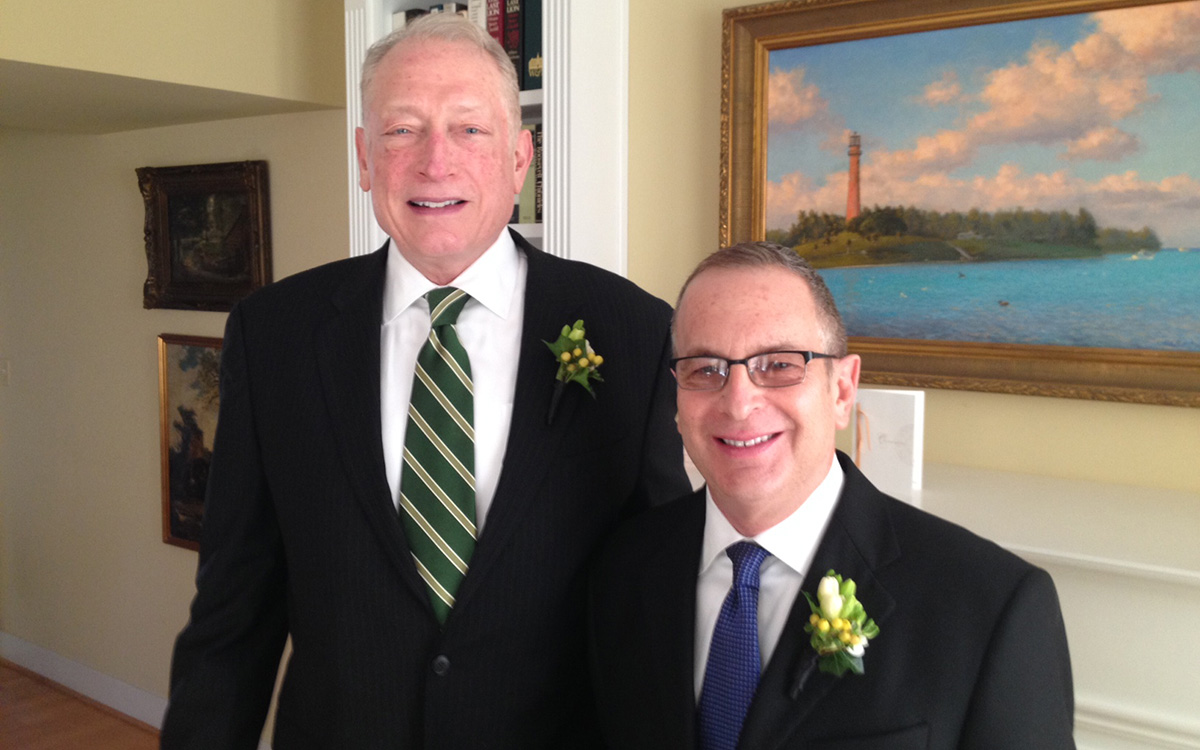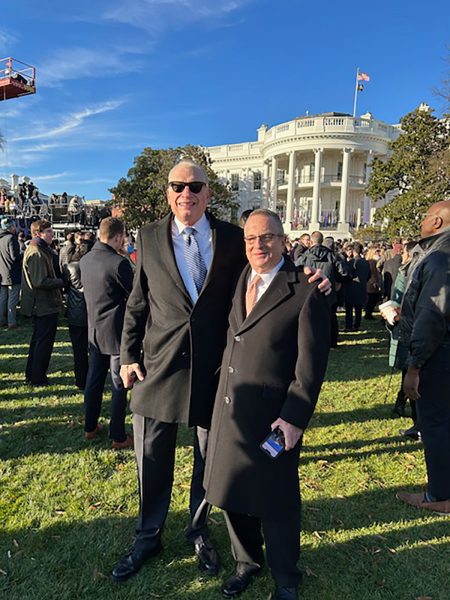National
A remembrance of Justice Sandra Day O’Connor by the gay couple she married
Late legal legend made LGBTQ history when she officiated wedding of Trammell, Serkin

It’s been a little over a decade, but the memory of their wedding day in 2013 is fresh in the minds of Jeffrey Trammell and his love of 46 years, Stuart Serkin. The setting was the lawyer’s lounge of the U.S. Supreme Court. Their officiant was retired Associate Justice Sandra Day O’Connor, who died earlier this month.
“She couldn’t have been more delightful,” recalled Trammell in an interview with the Washington Blade about that very special Tuesday, Oct. 29, 2013, when these lawyer lobbyists from Florida tied the knot and made LGBTQ history.
Of all days, the couple got stuck in a funeral procession amid the typically notorious D.C. traffic, as they made their way from Logan Circle to the iconic white marble building. They arrived 20 minutes late. Trammell wore a wingtip on one foot, and a black sneaker on his other, broken foot.
“She gave me a hard time about being a little late and wearing a shoe that was not appropriate for a wedding,” he said. “That was quite common for her, a sort of disarming sense of humor.”
The Arizona native was the epitome of “down-to-earth,” Trammell said.
“Her style was such that you were completely at ease, she had the capacity to connect with people,” he said. “I think it’s one reason she was very popular in Washington and internationally, very sought after as a speaker and a member of the boards because she was anything but aloof. She was very common-sense, down-to-earth and had a good sense of humor. So, you enjoyed being around her.”
Trammell had met O’Connor before. In 2011, he was elected rector at his alma mater, William & Mary, as the first out gay board chair of a major university in the United States. O’Connor was serving as the university’s chancellor, while also maintaining an office she kept at the high court, even after retiring in 2005.
“So, I went to see her at the Supreme Court,” said Trammell. “I thanked her for her vote on Lawrence v Texas, and I told her that she made my partner and me no longer felons in our own country.”
O’Connor argued in that 6-3 ruling by the Supreme Court on June 26, 2003, that a Texas statute banning consenting gay adults from engaging in sexual acts violated the 14th Amendment. Exactly 12 years later, same-sex marriage was legalized nationwide by the Supreme Court, on June 26, 2015, in the landmark decision in Obergefell v. Hodges. The vote was 5-4 in favor, with O’Connor’s successor, far right conservative Justice Samuel Alito, voting in dissent.
Of course, by then, Washington, D.C. had long embraced marriage equality, ever since March 3, 2010. And in 2013, after being partners for more than three decades, the two lawyers decided it was finally time to get hitched.
“Stuart and I wanted to get married, so I asked her. And she said, ‘Sure,’” said Trammell.
If that seems like it was too easy, it’s important to note these guys were well known in the District.
In addition to Trammell & Company, the lobbying firm he and Serkin managed, Trammell had been a staff member at the House of Representatives and the Senate, served on the Gay & Lesbian Victory Fund Board of Directors, Human Rights Campaign Board of Advisors, on the LGBT Victims Remembrance Project for the U.S. Holocaust Museum and was Senior Advisor for LGBT Outreach and for Business Outreach on Al Gore’s 2000 presidential campaign. He also worked on John Kerry’s presidential campaign in 2004 and Hillary Clinton’s 2016 bid for the White House.
Both retired now, Serkin was a prominent legislative attorney in Washington. He met Trammell in 1977 in a bar exam class in Florida. Trammell grew up in Blountstown, Fla., where he led his basketball team to the state championship, was named High School All-American and won a basketball scholarship to William & Mary, where he served as the captain of the men’s basketball team.
Even with their illustrious resumes, they did not expect that their wedding would become front-page news.
“There was an AP reporter around who saw what was going on and wrote an AP piece. And by the time we got home, I went online to see there were stories all over the country,” he said. “It was interesting to see some of the backlash from the very conservative religious folks who opined that she had violated God’s will. I’m sure she never bothered to read things like that because she never minded controversial subjects. There was a lot of positive coverage, but it’s a reminder that there are detractors out there.”
Their wedding even made The New York Times. But as it turns out, Trammell, Serkin and O’Connor were upstaged by none other than RBG.
“’Keep it quiet’,” Trammell said a journalist friend had advised him, after they had set the date, booked the officiant and the historic venue. “’Maybe you will be the first one married in the building!’” But their wedding wasn’t the first in that landmark, nor the first officiated by a justice. “[Ruth Bader] Ginsburg, RBG, beat us by a few days when she married one of her former clerks.” That was the first same-sex wedding inside the Supreme Court building. “So, we were number two,” said Trammell.
As The Washington Blade reported in September 2013, Ginsburg was the first Supreme Court justice to officiate at a same-sex wedding, when Kennedy Center President Michael M. Kaiser married his partner, economist John Roberts. Trammell and Serkin can at least claim they are the first same-sex couple to be married by a retired Supreme Court justice, a conservative one at that.
O’Connor was a life-long Republican from Arizona, appointed by Ronald Reagan in 1981. Following her death at age 93 on Dec. 1 from complications related to advanced dementia and a respiratory illness, Trammell reflected on this famous person he got to know, whose opinions over the years showed she had evolved.
“She grew and learned, and she was a great listener,” he said. “A lot of people think to have been a member of the court means they listen to people. You know, politicians don’t survive if they don’t have their ear to the ground and learn from what’s going on in society. I would venture that that was a factor in her growth in support of our community during those years. And I think it’s a logical extension that she eventually grew on other issues, too, on abortion and affirmative action.”

Of all the memories of O’Connor, Trammell said it was her personal touches on their wedding day that stand out.
“She had vows that she had used before when she married people and those were slightly modified to reflect we were a same-sex couple. It was just terrific,” said Trammell. “She was sharp as a tack. She was 83 at that point and had a cane she used to walk. But there was no indication of any future challenges with dementia.”
He said after officiating what turned out to be the first gay wedding inside the Supreme Court, O’Connor spent some quality time with the newlyweds.
“She signed our marriage license and spent time with us. And she just couldn’t have been nicer. I mean, you couldn’t ask for anything and anyone in that sort of position to be more down-to-earth and warm and friendly.”
U.S. Supreme Court
Supreme Court to consider bans on trans athletes in school sports
27 states have passed laws limiting participation in athletics programs

The U.S. Supreme Court on Thursday agreed to hear two cases involving transgender youth challenging bans prohibiting them from participating in school sports.
In Little v. Hecox, plaintiffs represented by the ACLU, Legal Voice, and the law firm Cooley are challenging Idaho’s 2020 ban, which requires sex testing to adjudicate questions of an athlete’s eligibility.
The 9th U.S. Circuit Court of Appeals described the process in a 2023 decision halting the policy’s enforcement pending an outcome in the litigation. The “sex dispute verification process, whereby any individual can ‘dispute’ the sex of any female student athlete in the state of Idaho,” the court wrote, would “require her to undergo intrusive medical procedures to verify her sex, including gynecological exams.”
In West Virginia v. B.P.J., Lambda Legal, the ACLU, the ACLU of West Virginia, and Cooley are representing a trans middle school student challenging the Mountain State’s 2021 ban on trans athletes.
The plaintiff was participating in cross country when the law was passed, taking puberty blockers that would have significantly reduced the chances that she could have a physiological advantage over cisgender peers.
“Like any other educational program, school athletic programs should be accessible for everyone regardless of their sex or transgender status,” said Joshua Block, senior counsel for the ACLU’s LGBTQ and HIV Project. “Trans kids play sports for the same reasons their peers do — to learn perseverance, dedication, teamwork, and to simply have fun with their friends,” Block said.
He added, “Categorically excluding kids from school sports just because they are transgender will only make our schools less safe and more hurtful places for all youth. We believe the lower courts were right to block these discriminatory laws, and we will continue to defend the freedom of all kids to play.”
“Our client just wants to play sports with her friends and peers,” said Lambda Legal Senior Counsel Tara Borelli. “Everyone understands the value of participating in team athletics, for fitness, leadership, socialization, and myriad other benefits.”
Borelli continued, “The U.S. Court of Appeals for the Fourth Circuit last April issued a thoughtful and thorough ruling allowing B.P.J. to continue participating in track events. That well-reasoned decision should stand the test of time, and we stand ready to defend it.”
Shortly after taking control of both legislative chambers, Republican members of Congress tried — unsuccessfully — to pass a national ban like those now enforced in 27 states since 2020.
Federal Government
UPenn erases Lia Thomas’s records as part of settlement with White House
University agreed to ban trans women from women’s sports teams

In a settlement with the Trump-Vance administration announced on Tuesday, the University of Pennsylvania will ban transgender athletes from competing and erase swimming records set by transgender former student Lia Thomas.
The U.S. Department of Education’s Office for Civil Rights found the university in violation of Title IX, the federal rights law barring sex based discrimination in educational institutions, by “permitting males to compete in women’s intercollegiate athletics and to occupy women-only intimate facilities.”
The statement issued by University of Pennsylvania President J. Larry Jameson highlighted how the law’s interpretation was changed substantially under President Donald Trump’s second term.
“The Department of Education OCR investigated the participation of one transgender athlete on the women’s swimming team three years ago, during the 2021-2022 swim season,” he wrote. “At that time, Penn was in compliance with NCAA eligibility rules and Title IX as then interpreted.”
Jameson continued, “Penn has always followed — and continues to follow — Title IX and the applicable policy of the NCAA regarding transgender athletes. NCAA eligibility rules changed in February 2025 with Executive Orders 14168 and 14201 and Penn will continue to adhere to these new rules.”
Writing that “we acknowledge that some student-athletes were disadvantaged by these rules” in place while Thomas was allowed to compete, the university president added, “We recognize this and will apologize to those who experienced a competitive disadvantage or experienced anxiety because of the policies in effect at the time.”
“Today’s resolution agreement with UPenn is yet another example of the Trump effect in action,” Education Secretary Linda McMahon said in a statement. “Thanks to the leadership of President Trump, UPenn has agreed both to apologize for its past Title IX violations and to ensure that women’s sports are protected at the university for future generations of female athletes.”
Under former President Joe Biden, the department’s Office of Civil Rights sought to protect against anti-LGBTQ discrimination in education, bringing investigations and enforcement actions in cases where school officials might, for example, require trans students to use restrooms and facilities consistent with their birth sex or fail to respond to peer harassment over their gender identity.
Much of the legal reasoning behind the Biden-Harris administration’s positions extended from the 2020 U.S. Supreme Court case Bostock v. Clayton County, which found that sex-based discrimination includes that which is based on sexual orientation or gender identity under Title VII rules covering employment practices.
The Trump-Vance administration last week put the state of California on notice that its trans athlete policies were, or once were, in violation of Title IX, which comes amid the ongoing battle with Maine over the same issue.
New York
Two teens shot steps from Stonewall Inn after NYC Pride parade
One of the victims remains in critical condition

On Sunday night, following the annual NYC Pride March, two girls were shot in Sheridan Square, feet away from the historic Stonewall Inn.
According to an NYPD report, the two girls, aged 16 and 17, were shot around 10:15 p.m. as Pride festivities began to wind down. The 16-year-old was struck in the head and, according to police sources, is said to be in critical condition, while the 17-year-old was said to be in stable condition.
The Washington Blade confirmed with the NYPD the details from the police reports and learned no arrests had been made as of noon Monday.
The shooting took place in the Greenwich Village neighborhood of Manhattan, mere feet away from the most famous gay bar in the city — if not the world — the Stonewall Inn. Earlier that day, hundreds of thousands of people marched down Christopher Street to celebrate 55 years of LGBTQ people standing up for their rights.
In June 1969, after police raided the Stonewall Inn, members of the LGBTQ community pushed back, sparking what became known as the Stonewall riots. Over the course of two days, LGBTQ New Yorkers protested the discriminatory policing of queer spaces across the city and mobilized to speak out — and throw bottles if need be — at officers attempting to suppress their existence.
The following year, LGBTQ people returned to the Stonewall Inn and marched through the same streets where queer New Yorkers had been arrested, marking the first “Gay Pride March” in history and declaring that LGBTQ people were not going anywhere.
New York State Assemblywoman Deborah Glick, whose district includes Greenwich Village, took to social media to comment on the shooting.
“After decades of peaceful Pride celebrations — this year gun fire and two people shot near the Stonewall Inn is a reminder that gun violence is everywhere,” the lesbian lawmaker said on X. “Guns are a problem despite the NRA BS.”
-

 U.S. Supreme Court3 days ago
U.S. Supreme Court3 days agoSupreme Court to consider bans on trans athletes in school sports
-

 Out & About3 days ago
Out & About3 days agoCelebrate the Fourth of July the gay way!
-

 Virginia3 days ago
Virginia3 days agoVa. court allows conversion therapy despite law banning it
-

 Maryland5 days ago
Maryland5 days agoLGBTQ suicide prevention hotline option is going away. Here’s where else to go in Md.










